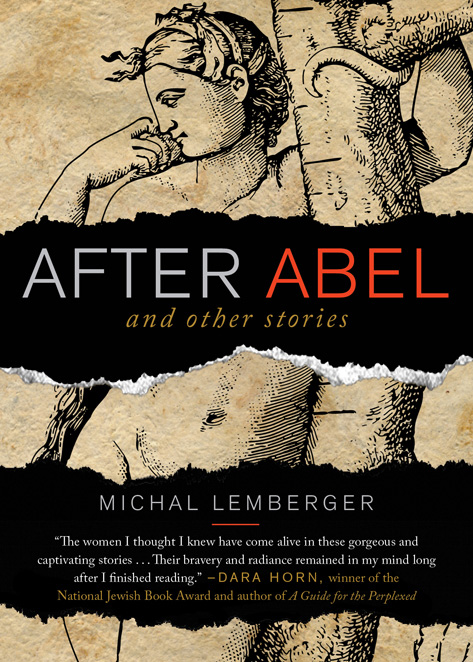
After Abel
And Other Stories
کتاب های مرتبط
- اطلاعات
- نقد و بررسی
- دیدگاه کاربران
نقد و بررسی

February 9, 2015
Biblical stories and their female characters get an entirely new, often surprising perspective in Lemberger’s fiction debut. In each of nine independent narratives, Lemberger, a professor who teaches the Bible as literature at American Jewish University in Los Angeles, creates a complete world based loosely on the biblical accounts of the origins and history of the Jewish people. Unlike the original text, which typically gives a sentence or two to the female characters, she creates a full-fledged picture of those lives and shares the characters’ thoughts and actions. Included in the volume are stories about Eve; Zeresh, Haman’s wife; Yael, the Kenite woman who beheaded the Caananite general Sisera; and Hannah, barren but beloved, and Penina, fertile but hated, both of them wives to Elkanah. The stories are fresh and engaging, but Lemberger’s literary license may offend some more biblically conservative readers, such as when she portrays Hagar, Abraham’s concubine and mother of Ishmael, as a dimwit, and Lot’s wife as an accidental destroyer. Still, her knowledge of the Bible is evident and her creativity shines through as she weaves nine thoughtful and layered accounts of distant, complicated times.

February 15, 2015
In this debut collection, nine stories shed light on Old Testament women famous, infamous and obscure. "God said one thing. The snake said another. Which is how I learned that someone had to be lying," Eve remarks in the title story. Where the Bible's women are concerned, Lemberger, a respected scholar in the field, is as skeptical as Eve. After her husband (in "Lot's Wife") threatens to throw his daughters to a mob of rapists, Lot's wife rescues the girls, torches Sodom and escapes-no divine wrath or pillar of salt in sight. The familiar story of Sarah and Hagar ("The Watery Season") highlights the downside of selling young women as handmaidens to produce children for men whose wives are barren. In Lemberger's take on Exodus ("Drawn from the Water"), colicky, wailing Moses can't be hidden, like other male newborns, from the Egyptian slave masters, so his sister Miriam, a wisecracking adolescent, is charged with setting him afloat in the Nile. The reader's sympathy will be drawn not to established biblical heroes but to misunderstood or otherwise marginalized minor players. Vashti, the deposed queen of Persia, and her sister Zeresh, the narrator, are the focus of "Zeresh, His Wife," not Esther, who takes Vashti's place, nor her uncle Mordechai, who brings down Zeresh's hapless husband, Haman. When Yael, in "City of Refuge," kills enemy general Sisera, she is glorified by warrior queen Deborah; but Yael is revealed as a true pacifist. In "Shiloh," fecund Penina, another woman sold as a "breeder" and traditionally seen as resentful, nobly forgoes an opportunity to displace her rival wife, Hannah. The most villainous character here is King David: Not only does he overthrow his mentor, King Saul, but he abandons his first wife, Saul's daughter Michel, for years, forcibly reclaiming her out of spite ("Saul's Daughter"). While avoiding outright irreverence or anachronism, Lemberger's diction gives cogent voice to all her underestimated or overlooked narrators. Original and thought-provoking.

November 15, 2016
A 2015 National Jewish Book Award finalist and Sophie Brody Award honorable mention, these nine fabulous tales give voice to Eve, Lot's Wife, Miriam, Hagar, Zeresh, and other noted biblical women. Lemberger, who has taught the Hebrew Bible as literature at UCLA and the American Jewish University, asks and answers the question: What would these women say if we gave them a chance to speak? Read-Alikes Marek Halter's Sarah and Zipporah, Rebecca Kohn's Seven Days to the Sea, and Simone Selitch's Moses in Sinai.
Copyright 2016 Library Journal, LLC Used with permission.

March 1, 2015
Largely quiet in the Bible, Eve here gains a voice, putting into words the turbid emotions she experiences upon leaving the Garden of Eden as an exile. Updating the midrash tradition for twenty-first-century readers, Lemberger brings Eveand eight other biblical womenback to life in stories endowing scriptural narratives with new imaginative resonance. Readers share, for instance, Eve's searing grief at having lost a sontwo sonsthrough fratricide. Readers experience with Miriam the anxiety of watching an infant brother drift toward strangers on the banks of the Nile. In several tales, Lemberger transports readers into the lives of women barely glimpsed in scripturePenina, wife of Elkanah, for example, and Achsah, daughter of Caleb. In the final chapter, however, Lemberger identifies Ruth as the one book of scripture too perfect to amplify with even a single embellishing word. Some devout readers will detect in Lemberger's tales a creative vision owing less to religious faith than to modern feminism. But this provocative reimagining of biblical history will attract many.(Reprinted with permission of Booklist, copyright 2015, American Library Association.)

























دیدگاه کاربران